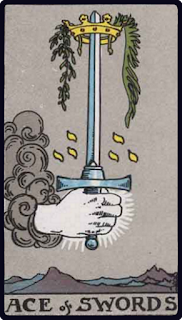
Representing beginnings; the Ace of Swords is associated with the seed of thought, an idea or a concept emerging and taking form. Our awareness is raised, and our conscious effort commences. It is difficult to prevent undesirable thoughts from taking root, and unfortunately these thoughts spread like weeds in a garden, once rooted a conscious effort is needed to mitigate their influence.
In the upright state the Ace of Swords calls upon us to make this conscious effort, this requires forethought and planning. This is the foundation stage where we should consider our ideas and give them as much detail to it as we can. It can be hard to consider confronting negative thoughts in particular as a good idea, you may prefer to repress those ideas but doing so will not remove them from your unconscious mind. Repression is akin to cutting the weed above the ground, the roots remain unseen. It is only through exploration of thought that you can remove uncertainty, and understand just how deep those roots go.
In the inverted state the Ace of Swords warns against stagnation and complacency, to entertain ideas without investing effort into them to give them form will otherwise lead to fleeting thoughts that lead nowhere, threats will go unnoticed and potential will go wasted.
In the Rider-Waite deck the Ace of Swords is depicted by a single sword held in the hand of God which emerges from a cloud to the left. Once more the Latin word for ‘left’ is ‘sinister’ and represents God’s attitude to Knowledge as being routed in the pursuit of malcontent. It is important to stress here however, that although the Tree of Knowledge was forbidden, the act of learning in itself was not. The sin committed was not that of curiosity or learning but the pursuit of knowledge that was specifically forbidden, to this end God does not wish for you to remain ignorant but rather for you to understand that temptation gains strength when it is realised, the more focus you give to it, the more power and influence it gains. This growth happens with greatest rapidity when you have already gained awareness but then repress your thoughts. As hard as it may be, you must confront them and follow their path in your mind to its end lest you be tempted to follow the path in life to learn its end first-hand.
Atop the sword a crown can be seen representing the prize, or victory which we seek, its precarious position is a warning not to do harm in our pursuit lest harm be done to us in the process. From this crown there are two green laurels that descend. The left, is an olive branch which represents peace in wisdom, and the right is a palm which represents the bounty in knowledge, their presence is curious.
The Book of Genesis which tells the story of Eden does not explicitly state which fruit grew on the Tree of Knowledge that the first humans consumed, despite artistic works often depicting this as an apple – this was never explicitly stated to be such. There were however said to be 2 particular trees of note in Eden, the Tree of Knowledge, and the Tree of Life. The presence of these laurels on the Ace of Swords implies the belief that the Olive Tree was the Tree of Life, and that the Palm Tree was the Tree of Knowledge, with their fruits being olives and dates respectively.
The presence of symbols of knowledge and wisdom represent the need to balance what we know in theory with what we know in practice and find balance between the two, or to accept the cognitive dissonance caused by the conflict of the two.
In self-reflection the Ace of Swords serves as a prompt to consider novel thoughts – those ideas and contemplations that are new to us or that we are experiencing as new once more because our familiarity has faltered after an extended period of time.
Our thought patterns become engrained over time, if we take language as an example, when we first set out to learn a new language our emphasis is placed on grammar and syntax; we reflect constantly on our actions in this case for example our speech, and retain a level of awareness that slowly fades. The more comfortable and confident we become speaking that language the less time we devote to our conscious thoughts of grammar and syntax. Whilst we eventually reach a point where these no longer remain in the conscious mind, they are not entirely forgotten.
The Ace is one of the most important cards in this suit because thoughts and ideas, particularly those of a toxic or negative nature can be very difficult to weed out once they have taken root; being aware of these thoughts at their point of entry is therefore integral to maintaining a balanced mental state.
Ask yourself “What is influencing my thoughts?” or “How do those stimuli then affect me emotionally?” - It’s important to note here, whilst emotions and feelings are the domain of the Cups, our thoughts can provide a pathway to those emotions. Being aware of our thought process as a running thread is important, which is why the Swords need to be considered in the context they appear when reading cards in a Spiritual or Holistic approach.
From a Scientific standpoint, being aware of how your thoughts are affecting your emotional state is the most prescient concern. Once you can raise your awareness of these influences you can take steps to mitigate their impact or to minimise your exposure to stimuli that trigger these thought processes.

No comments:
Post a Comment
All comments are moderated before they are published. If you want your comment to remain private please state that clearly.